The products and solutions needed for the workplaces of tomorrow.

September 1st, 2024
The workplace of 2024 is an enigma in the world of design. Against a backdrop of newfound work/life balances, and juxtaposing conversations about return-to-work policies, we’re left wondering where the next five years will take us. And as industry grapples to navigate this uncertainty, it’s up to designers to create agile, intuitive spaces that respond to the needs of employers and employees now and into the future.
With such a challenging task ahead, leading commercial furniture supplier Zenith is helping simplify the way forward, with the concept of a future-proofed workplace that combines the pillars of technology, adaptability, and sustainability to create the offices of tomorrow. Informed by decades of experience in strategy-led furniture design, their range of products and solutions are specifically targeted to an evolving office environment and an entirely new commercial design typology.
Zenith’s future-work model reflects hybrid and blended ways of working, where physical offices are less of a “home base” and more of a “hub”, or an epicentre for collaboration, creativity, connection and independent focus. While many envision a workplace utopia like this, Zenith are making the vision a reality, prioritising furniture and technology that facilitates highly productive and task-focused workspaces that also make a positive environmental impact.

Tech-compatible solutions
Encapsulating Zenith’s first pillar of a future-proofed workplace – technology – is their acoustic pod, Verse. Verse is one of the most adaptive acoustic pods on the market, with three sizes (Verse 1 Phone Booth, Verse 2 Meeting Room and Verse 3 Meeting Room) helping to create intelligent and active micro-environments for relaxation, private calls, focused work, or meetings and conversation.
Each Verse is compatible with Zenith’s ‘Rooms’ technology, a software that creates a seamless booking experience while also providing valuable analytics on room occupancy. Floorsense optical sensors can also add to the rich data experience, with ceiling-mounted optical sensors feeding occupancy insights into a Floorsense dashboard and floor plan display for real-time observations on space utilisation for capacity planning.
While the adaptability of Verse makes its longevity embedded in its concept, end-of-life has also been considered, with the absence of silicone adhesives meaning the pods can be easily taken apart for recycling.
On the office floor, the Orbis Adapt desk is ideal for hot-desk workplaces. An innovative desking solution powered by a fully integrated battery, Orbis Adapt is customisable for different workers, featuring electric height adjustment, laptop and mobile device charging, privacy screening, and a folding worktop. An integrated pull handle and lightweight design enable it to be easily relocated, reconfigured, or stored away, making it ideal for fixed office layouts as well as more agile designs.

Adaptive design
If we think of modern workplaces as a “hub”, it stands to reason that adaptable furniture is an absolute imperative. Transformative designs that shift from individual units to combined pieces are able to facilitate everything from quieter office days to whole-team collaborative work, helping to optimise floor space and productivity.
The Mekos Range by Zenith Design studio is a family of tables that share a common hoop leg design language. The range provides options for sitting, standing, powered and unpowered work according to task requirements and business needs. For example, a four-person meeting table can have power access, allowing a hybrid worker to collaborate, or perform focused work according to requirements.
Meanwhile, the Precinct range by Zenith Design Studio offer spatial fluidity with a family of products including pods, ottomans, lounges, booths and screens that can be combined to create ‘spaces within spaces’. Easily configurable for a changing layout or expanding team, the range can be combined or separated to help power everything from focused work to collaboration.
The Kissen Table range draws on both of these collections, as a range of tables that can serve as a workstation pod, collaboration and meeting table, touch down team table and a conference/tutorial table. Fixed and folding tops mean it can be used for transient spatial needs or permanent settings, with the omni fold feature allowing for rapid adaptability. Cable integration is reticulated through the leg and cast headers enabling daisy chaining, and presenting a contemporary cable free appearance.

A sustainable fitout future
Regardless of what the future of the workplace looks like, Zenith is committed to realising it sustainably, with their products specifically designed to achieve fit outs that have a positive environmental impact.
The acclaimed JAC range brings an ethical and sustainable story to what is already a poised and cohesive seating collection; featuring a polypropylene shell made of 95% recycled material, and a ‘One JAC One Tree‘ initiative, whereby a tree is planted for every JAC sold. To date, over 80,000 trees have been planted across APAC.
Although all Zenith designed products are Greenguard certified, ensuring they meet international environmental certification standards, the forward-thinking Denn chair takes this a step further. Utilising up to 58% recycled material, Denn embraces a post-plastic era by transforming upcycled low-grade waste materials into innovative and ergonomic task seating. For instance, the distinctive knitted back surface by Camira is made using SEAQUAL® YARN, a 100% post-consumer recycled polyester fabric which contains upcycled marine plastic litter.

In embracing principles of ‘future-proofing’ encompassing technology, adaptability, and sustainability, Zenith’s solutions not only address contemporary work requirements but also contribute to creating resilient and enduring workspaces for the future. As organisations continue to navigate the complexities of the evolving work landscape, design strategies that prioritise thoughtful and innovative designs will facilitate the flexibility to foster productivity, collaboration, and employee satisfaction in the years ahead.
INDESIGN is on instagram
Follow @indesignlive
A searchable and comprehensive guide for specifying leading products and their suppliers
Keep up to date with the latest and greatest from our industry BFF's!
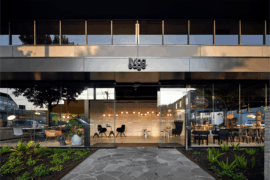
For Aidan Mawhinney, the secret ingredient to Living Edge’s success “comes down to people, product and place.” As the brand celebrates a significant 25-year milestone, it’s that commitment to authentic, sustainable design – and the people behind it all – that continues to anchor its legacy.
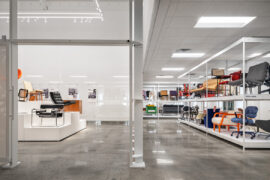
The undeniable thread connecting Herman Miller and Knoll’s design legacies across the decades now finds its profound physical embodiment at MillerKnoll’s new Design Yard Archives.
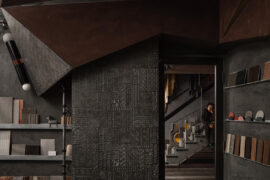
Bangalore studio Multitude of Sins elevates true leftovers — not surplus — into a richly layered workspace where waste materials become narrative, structure and sculptural expression.
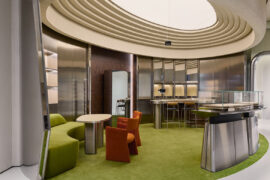
Inside Bangkok’s Siam Paragon Mall, L’Atelier by Dinding Design Office celebrates the artistry of independent watchmaking through a space defined by light, craft and meticulous detail.
The internet never sleeps! Here's the stuff you might have missed
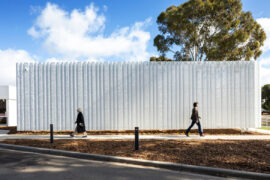
Through expert architecture, EBD Architects has provided a human face to great design and created a project that enhances the lives of people and community.
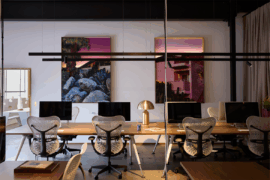
With a minimalist aesthetic and an inventive approach to product, ZETR is challenging the way electrical accessories are designed, made and experienced.